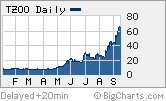
NEW YORK (CNN/Money) -
I'm sure you've heard of Priceline.com and Orbitz. You may have even booked a flight or hotel through their Web sites.
But how about a little company called Travelzoo? Probably not.
Then why are its shares up 650 percent this year, giving Travelzoo a market value of $1 billion?
That's a higher value than both Priceline and Orbitz, and the stock now trades at nearly 170 times the 2005 earnings estimate of the one analyst who follows the company.
All this is, to put it bluntly, simply ludicrous.
Sure, Travelzoo is doing extremely well. Travelzoo generates revenues by listing fares on its Web site and in e-mail newsletters from airlines, hotel operators and rental car companies.
Note, it's not an online booking agent. Rather, Travelzoo is benefiting from favorable trends in online advertising and does not have to worry about fare discounting and increased marketing expenses, problems that are plaguing companies like Orbitz, Priceline and IAC/InterActive -- which owns Expedia, Hotels.com and Hotwire.
As such, Travelzoo's second quarter earnings were up 124 percent from a year ago and sales surged 68 percent.
But even though Travelzoo is growing rapidly, it's still tiny. The company earned $1.3 million in the second quarter on revenues of $7.2 million.
And considering that Travelzoo is only expected to report sales of $31 million this year and $40 million in 2005, it's hard to justify the company's more than $1 billion market capitalization.
"The valuation of Travelzoo is reaching dizzying heights and at some point the fundamentals have to be taken more seriously," wrote Brian Bolan, an analyst with Marquis Investment Research, in a recent report. Bolan does not formally cover the stock.
Shorts are getting squeezed at the zoo
So why does the stock keep climbing higher? Travelzoo doesn't have that many shares -- about 15.45 million outstanding. And insiders own most of the stock. The float, or number of shares available to the public, is just 1.9 million. Given this relatively small supply of shares, it doesn't take much to move the stock price.
| �* based on fiscal 2005 estimates and price as of 9/15/04 | | �Source:��Thomson/Baseline |
|
Now add in that short sellers, who bet that a stock will go down, are making a big gamble on Travelzoo, and that makes the stock even more volatile. Here's why.
About 706,000 shares, or 37 percent of Travelzoo's float, were being held short as of the beginning of August. Since short sellers borrow stock and have to eventually buy it back, they are often forced to repurchase shares in droves if the stock suddenly rises or risk getting hit with huge losses, a phenomenon known as a short squeeze
That's clearly what is happening.
| Recently in Tech Biz
|

|
|
|
|
"When you have a float that is so small, it doesn't take much buying to create a decent amount of pain to squeeze the short sellers," said George Mihalos, an analyst with Brean Murray. He is the only sell-side analyst officially covering the stock.
That's not a good sign. Even though the stock is rising dramatically, it's not for rational reasons. In fact, a large percentage of investors are bearish on the stock.
Don't feed the animals
Travelzoo stock has run even as Internet bellwethers Yahoo!, Amazon and eBay have struggled (see chart).
 |
|
| Shares of Travelzoo held up fine during the summer's Net stock swoon. |
And it has moved even on seemingly bad news. Consider this: On the day that Yahoo! launched a beta version of an online travel comparison search service called FareChase, shares of Travelzoo shot up nearly 25 percent!
Huh?
The entrance of Yahoo! into the fare listings business is not exactly a good thing for the much smaller Travelzoo because it could mean that the likes of Google, Microsoft's MSN and other Internet search firms might not be far behind.
"It would not surprise me to see other large Internet companies following Yahoo!'s lead in travel search," said Mihalos.
For now, Travelzoo does have momentum on its side. But that can't last forever.
"This is a classic case of short-term hysteria and mania. Who knows how much longer this can go up but eventually it's going down a lot," said Ethan McAfee, director of research with Capital Crossover Partners, a hedge fund that has no position in the stock.
So the average long-term investor shouldn't follow the lead of Simon and Garfunkel. It's not a fine and fancy ramble to Travelzoo.
Analysts quoted in this story do not own shares of Travelzoo or other companies mentioned and their firms have no investment banking relationships with any of these companies.
Sign up to receive the Tech Investor column by e-mail.
Plus, see more tech commentary and get the latest tech news.

|

